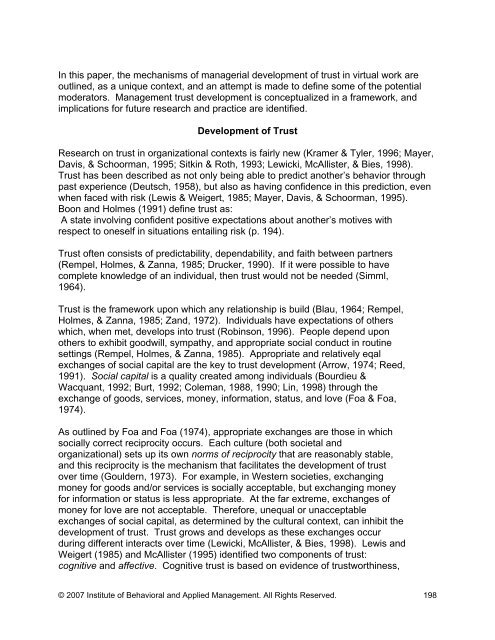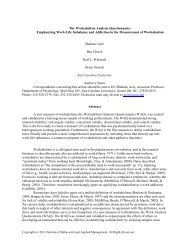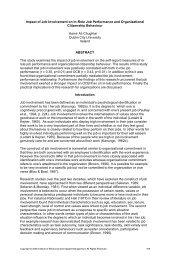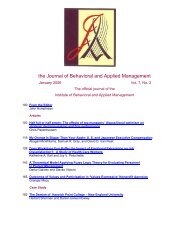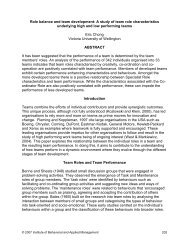Trust and the Manager-Subordinate Dyad - Ibam.com
Trust and the Manager-Subordinate Dyad - Ibam.com
Trust and the Manager-Subordinate Dyad - Ibam.com
Create successful ePaper yourself
Turn your PDF publications into a flip-book with our unique Google optimized e-Paper software.
In this paper, <strong>the</strong> mechanisms of managerial development of trust in virtual work are<br />
outlined, as a unique context, <strong>and</strong> an attempt is made to define some of <strong>the</strong> potential<br />
moderators. Management trust development is conceptualized in a framework, <strong>and</strong><br />
implications for future research <strong>and</strong> practice are identified.<br />
Development of <strong>Trust</strong><br />
Research on trust in organizational contexts is fairly new (Kramer & Tyler, 1996; Mayer,<br />
Davis, & Schoorman, 1995; Sitkin & Roth, 1993; Lewicki, McAllister, & Bies, 1998).<br />
<strong>Trust</strong> has been described as not only being able to predict ano<strong>the</strong>r’s behavior through<br />
past experience (Deutsch, 1958), but also as having confidence in this prediction, even<br />
when faced with risk (Lewis & Weigert, 1985; Mayer, Davis, & Schoorman, 1995).<br />
Boon <strong>and</strong> Holmes (1991) define trust as:<br />
A state involving confident positive expectations about ano<strong>the</strong>r’s motives with<br />
respect to oneself in situations entailing risk (p. 194).<br />
<strong>Trust</strong> often consists of predictability, dependability, <strong>and</strong> faith between partners<br />
(Rempel, Holmes, & Zanna, 1985; Drucker, 1990). If it were possible to have<br />
<strong>com</strong>plete knowledge of an individual, <strong>the</strong>n trust would not be needed (Simml,<br />
1964).<br />
<strong>Trust</strong> is <strong>the</strong> framework upon which any relationship is build (Blau, 1964; Rempel,<br />
Holmes, & Zanna, 1985; Z<strong>and</strong>, 1972). Individuals have expectations of o<strong>the</strong>rs<br />
which, when met, develops into trust (Robinson, 1996). People depend upon<br />
o<strong>the</strong>rs to exhibit goodwill, sympathy, <strong>and</strong> appropriate social conduct in routine<br />
settings (Rempel, Holmes, & Zanna, 1985). Appropriate <strong>and</strong> relatively eqal<br />
exchanges of social capital are <strong>the</strong> key to trust development (Arrow, 1974; Reed,<br />
1991). Social capital is a quality created among individuals (Bourdieu &<br />
Wacquant, 1992; Burt, 1992; Coleman, 1988, 1990; Lin, 1998) through <strong>the</strong><br />
exchange of goods, services, money, information, status, <strong>and</strong> love (Foa & Foa,<br />
1974).<br />
As outlined by Foa <strong>and</strong> Foa (1974), appropriate exchanges are those in which<br />
socially correct reciprocity occurs. Each culture (both societal <strong>and</strong><br />
organizational) sets up its own norms of reciprocity that are reasonably stable,<br />
<strong>and</strong> this reciprocity is <strong>the</strong> mechanism that facilitates <strong>the</strong> development of trust<br />
over time (Gouldern, 1973). For example, in Western societies, exchanging<br />
money for goods <strong>and</strong>/or services is socially acceptable, but exchanging money<br />
for information or status is less appropriate. At <strong>the</strong> far extreme, exchanges of<br />
money for love are not acceptable. Therefore, unequal or unacceptable<br />
exchanges of social capital, as determined by <strong>the</strong> cultural context, can inhibit <strong>the</strong><br />
development of trust. <strong>Trust</strong> grows <strong>and</strong> develops as <strong>the</strong>se exchanges occur<br />
during different interacts over time (Lewicki, McAllister, & Bies, 1998). Lewis <strong>and</strong><br />
Weigert (1985) <strong>and</strong> McAllister (1995) identified two <strong>com</strong>ponents of trust:<br />
cognitive <strong>and</strong> affective. Cognitive trust is based on evidence of trustworthiness,<br />
© 2007 Institute of Behavioral <strong>and</strong> Applied Management. All Rights Reserved. 198


